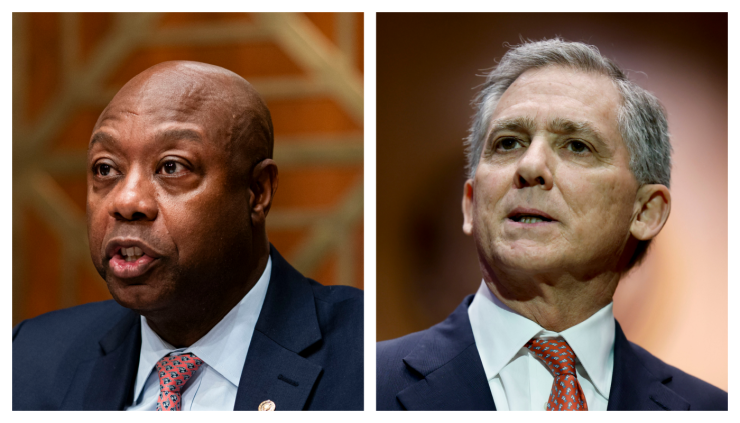
WASHINGTON — The heads of the House Financial Services Committee and Senate Banking Committee have introduced a Congressional Review Act resolution to nullify the Consumer Financial Protection Bureau's
The resolution, sponsored by committee chairs Rep. French Hill, R-Ark., and Sen. Tim Scott, R-S.C., would overturn the CFPB rule and prevent the bureau from pursuing a substantially similar one in the future. Hill had circulated
The CFPB rule caps overdraft fees at $5 for the largest banks, but also gives them the option of charging a sum deemed commensurate with the service's costs or to charge more if the bank discloses the fees' annual percentage rate as though it were any other consumer loan.
The CFPB's overdraft rule drew lawsuits from the banking industry almost immediately after being finalized in December. Republicans have
"The Biden administration's CFPB routinely targeted legitimate payment incentives and practices in pursuit of political headlines over sound policies," Scott said in a statement. "The overdraft rule was yet another example — many consumers rely on overdraft services to make ends meet and limiting this practice will push Americans to riskier financial products. I'm proud to lead the effort to overturn this misguided rule and protect Americans' access to important financial services."
Republican lawmakers, who alongside President Donald Trump control both houses of Congress and the White House, also complained that former CFPB Director Rohit Chopra continued to finalize rules — including the overdraft rule — in the final days of the Biden administration.
Consumer advocates immediately decried the CRA resolution, saying the agency's work protects consumers from scams and that limiting its power could have devastating consequences.
"For more than a decade, the CFPB has stood up for consumers, enacting sensible rules to ensure they are treated fairly and has returned billions of dollars to those who were cheated by banks and other financial firms," said Chuck Bell, advocacy programs director at Consumer Reports. "Our country learned the hard way how lax oversight of the financial marketplace can have severe consequences for families and the economy. Neutering the nation's financial watchdog will leave consumers vulnerable to scams and rip-offs and make it harder for many families to make ends meet."
Chopra did have the legal authority to finalize these rules, as he was still the Senate-confirmed director of the bureau at the time. Republicans had asked financial bank regulators to pause all rulemaking in the lame duck period, which they called "midnight rulemaking."
"Senate Banking Committee Chairman Tim Scott and I were clear when we told federal agencies — including the CFPB — to stop all midnight rulemaking, which former Director Chopra blatantly disregarded," Hill said in a statement. "As I have consistently said, the CFPB needs guardrails on its enforcement and rulemaking powers, and this rule is another clear example of why."
The CFPB has become the latest flashpoint for the Trump administration's effort to downsize what they see as wasteful spending in the federal bureaucracy. Trump ally and billionaire entrepreneur Elon Musk was tapped by Trump to lead the so-called Department of Government Efficiency, tasked with overhauling the federal government and workforce. Late last week the administration tapped Office of Management and Budget Director Russell Vought — a driving force behind the Heritage Foundation's Project 2025 blueprint for the administration — to lead the CFPB on an interim basis and subsequently ordered its employees to
The bureau also
CRA resolutions require only a simple majority vote and cannot be filibustered, so Republicans can pass the overdraft measure without Democratic support.
Both the House and the Senate would need to pass the resolution, and then it would go to President Trump's desk. There's






